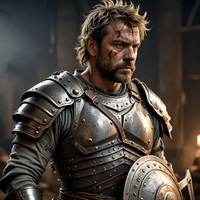cross-posted from r/Pathfinder2e
TL;DR: Turning the difficulty slider down can give a different experience that is still fun!
Let me start by saying I love PF2e. It’s not perfect but its my favorite high fantasy system that I’ve played and the main group I play with has been running 2e for a few years now and it has entirely been run in the DMs homebrew world (so no APs). All encounters are made by the DM.
One thing I noticed after a while is that my experience was different than the experience of others based on posts in this sub. A lot of the discourse focuses on “the value of a +1 bonus” or “Spellcasters aren’t actually weak” or around how to optimize or use teamwork to deal with severe encounters. All of which is super interesting but I think might be scary to a new person whos curious about the “vibe” of PF2e (particularly folks who might be emigrating from 5e). Its my understanding that a lot of this discussion came about due to some of the early APs being overtuned and kind of requiring optimizations and strategic thinking so I think its helpful to have those discussions for people running those types of campaigns but I wanted to offer a perspective from the other end of the difficulty scale.
As I said, the table I play in is a homebrew setting and the campaign is entirely the work of our lovely DM. The story is interesting, our characters are fun, and the encounters are interesting but… the difficulty very rarely rises above moderate. Early on when we were first getting used to the system there were a few encounters in the hard range that I think caught us off guard and the DM dialed back the difficulty and since then as never really ramped it up much other than for the occasional boss at the end of an arc. Most encounters also lean towards the “lots of lower level dudes” as opposed to “one big monster” which I think also contributes to the difference in tone.
At first I was kind of leery of this cause I enjoy some crunch and tactics (as do most of the people at the table) but I now realize that it’s pretty liberating. Knowing that I don’t need to squeek out every possible bonus really expands the options available. When optimizing there tends to be options that are just flat better than others (this is far less an issue in 2e than in other systems, mind you) and if you’re expecting to run into a severe encounter then “every +1 matters” becomes really really true. Choosing to take a suboptimal feat or spell or choosing to do an interesting but tactically unsound action can become real liability. But when you know that you can still pretty reliably hit even without flanking for offguard then you can start doing funny stuff without holding back your party.
This is especially true for spellcasters. I don’t think spellcasters are underpowered in 2e, but I do think that there are a lot of spells that sound cool but mechanically just don’t do enough. Well in our campaign, since everything tends to be lower level, suddenly those incapacitation spells start working as you fantasize them working. Hordes of mooks make wizards feel like gods again without overshadowing the “boss” encounters.
On the other side of the screen I feel like this also made things a bit more fun for our DM. If winning or losing fights aren’t as uncertain then you can start adding in extra variables without the fear of going to far. There was a point where I noticed that he started to get a lot more creative with the combat arenas. For example one fight was against a group of goblins all PL-2 or less. On paper probably a moderate encounter. But the fight took place on a series of suspended platforms over a bottomless pit, where everyone needed to hop from platform to platform. The goblins had a mix of shooters and bruisers who were trying to push us off the platforms. There was tension, there was drama, and there was silliness which made for an extremely rememberable encounter even though in hindsight the actual risk was relatively small.
Most of the “Drama” comes from the sandboxy nature of the campaign. The choices we make outside of combat tends to have the biggest effects.
In summary, this is just a post that says the difficulty slider can be turned down as well as up and the game is still fun. I’ve played it both ways with various groups and I see the benefits of both.
I really liked this post by u/Slavasonic over on Reddit. Not only does it reflect my own experience running a beer-and-pretzles game with childen (a pop-and-chips game?), but it’s actually not been down-voted into a smoking crater, which means it’s probably doing something to connect with people that I’ve not yet figured out.
As my table continues to evolve, I’ve become increasingly enthusiastic about 2e’s effectiveness in more casual games, and as a story engine for narrative and character-driven play. It provides a full “physics” engine in the box that I can tune to my heart’s desires. The result has been really great, and discussion of it has gotten a ton of pushback by the community over on Reddit.
Edit: NodeBB seems to be hijacking the blockquote formatting, so I’m switching to horizontal-rules to encapsulate the quoted post.

Weird. I wonder why the formatting broke. I’m going to fiddle with it some more.
please do :)